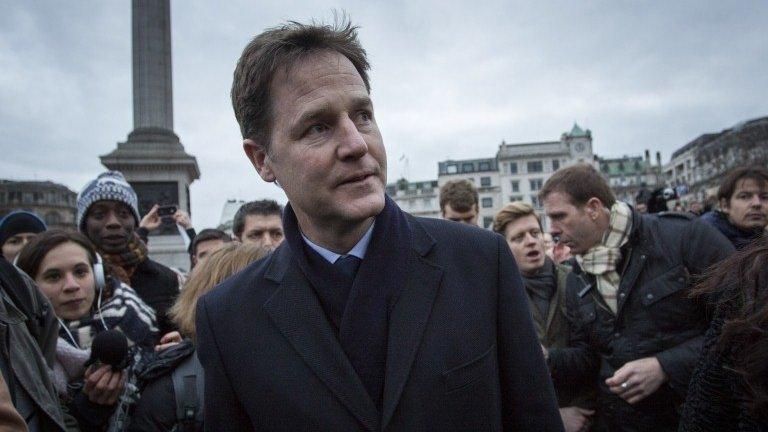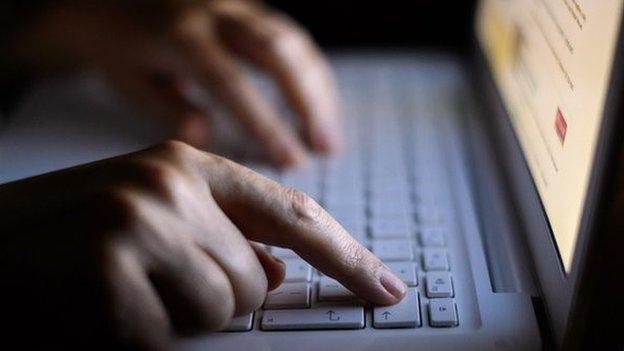Theresa May says 'lives at risk' without data surveillance
- Published
Theresa May said legislation must be passed to allow the security services greater access to communications data
Theresa May has said "innocent lives will be put at risk" unless the authorities are better able to track communications of suspected terrorists.
In a Commons statement on the Paris terror attacks, the home secretary defended her calls for internet firms to store details of people's activity on the internet and social media.
The Lib Dems have blocked plans for what they call a "snoopers' charter".
Labour warned of a "caricatured argument" between the parties.
Mrs May told MPs there was no cross-party consensus to give security services "the capabilities they need".
Without the Communications Data Bill, Mrs May said crimes "would go unpunished", and more people were in danger with "every day that passes".
The bill had not been about "letting the government snoop on your emails", she said.
"It is allowing the police and the security services - under a tightly regulated and controlled regime - to find out the who, when, where and how of a communication - but not its content."
She said it was "highly probably" that French authorities had used communications data to locate the suspects in last week's terror attacks.

Data laws

Draft Communications Data Bill 2012 - Would have extended the range of data communications companies have to store for 12 months. It would have included, for the first time, details of messages sent on social media, webmail, voice calls over the internet and gaming, in addition to emails and phone calls. Officials would not have been able to see the content of the messages without a warrant. The bill, dubbed the "snoopers' charter" by critics, was blocked by the Lib Dems.
Data Retention and Investigatory Powers Act 2014-15 - Introduced as emergency legislation to maintain the requirement for phone and internet companies to log records (but not content) of calls, texts and internet use.
Counter-Terrorism and Security Bill 2014-15 - Part of the bill going through Parliament would add to the Data Retention and Investigatory Powers Act to allow internet protocol (IP) address matching. This would identify the individual or the device that was using a particular IP address at any given time.

Shadow home secretary Yvette Cooper said a "caricatured argument" was developing between the Conservatives and Liberal Democrats about "security on the one hand, and liberty on the other".
She agreed updated legislation was needed to keep up with changing technology but asked why Mrs May had not approached her with revised proposals to tackle the issue.
Labour is supporting the Counter-Terrorism and Security Bill currently going through Parliament, which gives some new powers to the security services.
Former Home Secretary Jack Straw said it was "beyond argument" that new laws on communications data needed to be introduced and said Labour and the Conservatives were not far apart on the issue.
Liberal Democrat Tim Farron said the UK's response must be "one of sober wisdom", and said the government must not "squander civil liberties".
In the House of Lords, where Mrs May's statement was repeated, crossbench peer and former director general of MI5 Baroness Manningham-Buller said the government's "slow and considered" approach was "heightening the risk".
MPs from all sides of the house condemned the attacks in Paris, which killed 17 people as Islamist gunmen attacked satirical magazine Charlie Hebdo, a kosher supermarket and police officers.
Mrs May said the violence was "not about Islam" but "about a perversion of Islam", adding that there are "Muslims in this country and other countries around the world who condemn these acts of terrorism".
- Published13 January 2015

- Published13 January 2015

- Published12 January 2015
